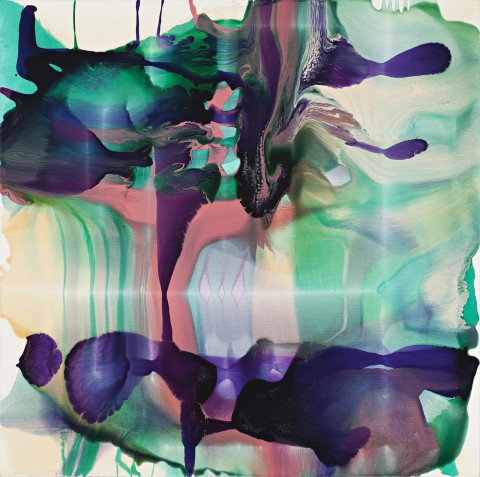WHEN ASKED HOW HE ACQUIRED HIS FINE COLLECTION OF FRENCH EMPIRE CLOCKS…, 2005
DALE FRANK
varnish and synthetic polymer paint on canvas
200.0 x 200.0 cm
signed and dated twice verso: Dale Frank / 2005
Roslyn Oxley9 Gallery, Sydney (label attached verso)
Private collection, Sydney
Sotheby's Australia, Melbourne, 26 November 2013, lot 41
Company collection, Sydney
Dale Frank, Roslyn Oxley9 Gallery, Sydney, 2 – 27 May 2006, cat. 15
Cockington, J., ‘Big Names at Low, Low Prices’, Sydney Morning Herald, Sydney, 20 November 2013
Featuring glistening marbled flows and ponderous slides of emerald, violet and coral pink poured across the canvas in layers of varying viscosity and translucency, When asked how he acquired his fine collection…, 2005 offers a particularly stunning example of the sumptuous, glossy abstractions for which Dale Frank has become so widely acclaimed. Brilliantly evocative in their epic scale, intense colouration and mesmerising, plasma-like reflections, such works typically engage with paradigms of science, poetics, spatialisation and time to offer a continually evolving dialogue upon the individual’s relationship to the immersive universe. Thus possessing the remarkable ability to completely absorb the viewer’s consciousness, Frank’s ‘performances’ not only complicate the customary roles of artist as creator and audience as passive observer, but powerfully highlight the psychological dimension inherent in perception itself.
Indeed, despite their inordinately specific, often witty titles and the swirling tides of sensuous tinted varnish which seem to convey the forces of nature in a manner reminiscent of Romantic painting, Frank is emphatic in his eschewal of any reference to the literal – his works are neither real nor imagined. Rather, each performance ‘creates itself’, evolving over time through the movement and chemical reactions between layers of strident, pulsating varnish in its molten liquid form ('a living entity'). As Frank elucidates, the blank white canvas is never a pristine ground that must be filled, rather 'a black space' where the final outcome is 'forced upon the Painting by the vagaries of its own Nature and makeup: its environment and material personality determine its image, its future, its relations within the world’.1
If Frank's technique appears ostensibly random or unpredictable however, such spontaneity belies a painstaking process of 'endurance and isolation'. As the luminous pools of pigmented varnish are poured onto the horizontal canvas and immediately begin to resist and coalesce, the artist must remain continuously attentive to the passing of time, the variations of climate, and the actions required by him at every stage – adding more varnish or changing the angle of support as necessary. As Frank reveals, 'It is a totally hands on and cerebral way of painting ... The process can take up to twenty-four hours where I have to be permanently standing over the painting, constantly considering every minute aspect’.2
With his visionary eloquence and technical ingenuity, Frank occupies an esteemed position at the forefront of Australian contemporary art practice. Awarded the prestigious Red Cross Art Award by John Olsen at the tender age of sixteen, his was a precocious talent and within only five years, he had achieved international recognition with solo exhibitions across Australia, Europe and America. Significantly, in 1983, his work was selected for display alongside Thomas Lawson and Anselm Kiefer at the Museo Palazzo Lanfranchi in Pisa, Italy, and in 1984, he was included in the Aperto section of the Venice Biennale. In 2000, the Museum of Contemporary Art, Sydney mounted the touring survey exhibition of his work Ecstasy: 20 years of painting; in 2005, Frank won the Arthur Guy Memorial Painting Prize at the Bendigo Art Gallery, Victoria and in 2007, his achievements were documented in the magnificent monograph So Far: the Art of Dale Frank 2005-1980. Today, his paintings are held in every major public collection across Australia, as well as numerous private and corporate collections around the world.
1. Frank, D., quoted in Chapman, C., 'Dale Frank: Performance into Painting' in Frank, D., So Far: the Art of Dale Frank 2005-1980, Schwartz City Publishing, Melbourne, 2008, p. 134
2. Frank, D., quoted in Crawford, A., ‘Dale Frank’, Art & Australia, Sydney, vol. 42, no. 2, 2004, p. 214
VERONICA ANGELATOS
